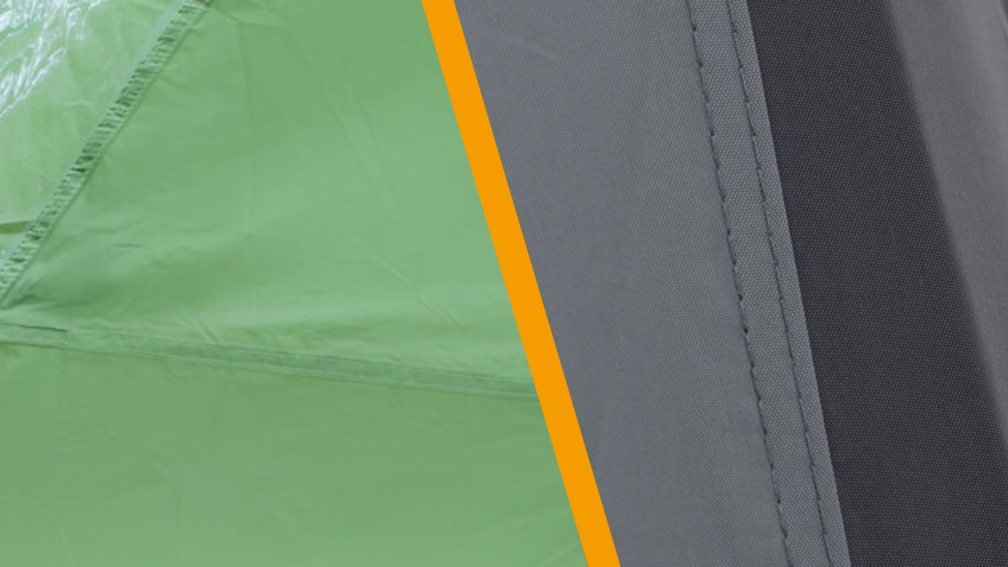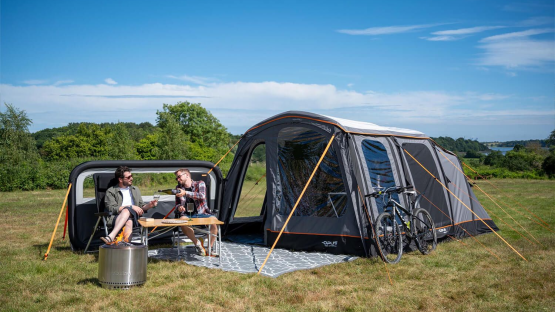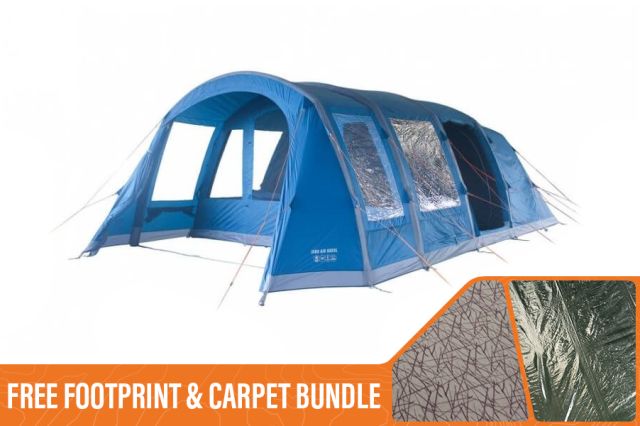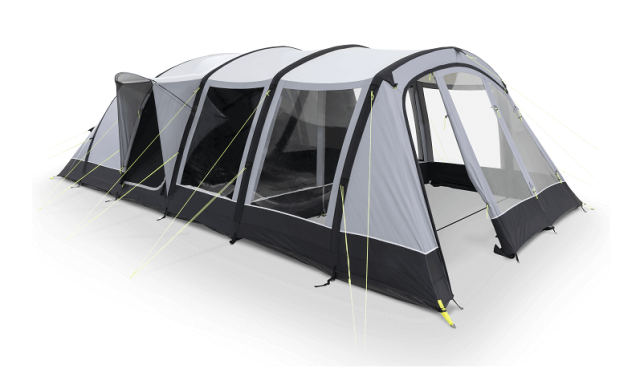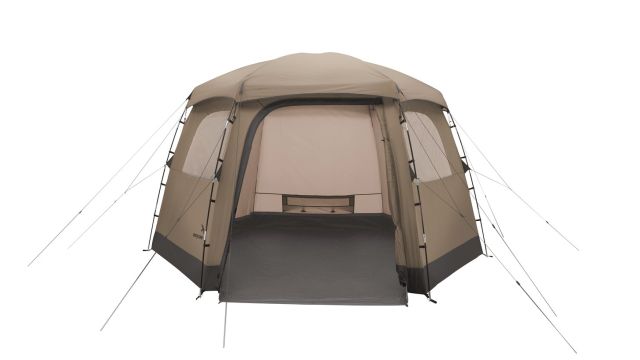Polyester Vs Polycotton Tents
Are you on the hunt for a tent this summer and not sure where to start? One question we get asked repeatedly is what is the difference between Polyester and Polycotton fabric for tents?
Both Polyester and Polycotton fabrics have pros and cons, so we hope this guide will give you a rundown of everything you need to know when choosing the right fabric for you.
What is Polyester Fabric?

Polyester is a fabric identified as either denier or thread count. The higher the denier/thread count, the higher the quality and durability of your tent will be. Commonly seen in women's hosiery, denier/thread count can be categorized as 70, 150, and 420, with 70 being the lowest and 420 being the highest quality.
Polyester is a popular fabric choice for campers because it is lightweight but also robust. Family campers tend to opt for 70 and 150 denier/thread count when choosing a tent for their holidays. The higher denier/thread count, 420, is mainly used for premium camping products such as caravan and motorhome awnings because they are left out all season.
70 Denier - Lowest level
150 Denier - Medium level
420 Denier - Highest level
Pros of Polyester Fabric
One of the main advantages of choosing a polyester tent is its weight. They are incredibly lightweight and great for single campers or adventure seekers. Polyester tents are also more weight-effective and ideal for single parents, so you don’t need to lug a huge, heavy tent from your car to the pitch.
Value for money is another major advantage of most polyester tents. If you're new to camping and not looking to break the bank, then choosing a polyester tent will be a great fit for you. Brands like Kampa offer great-quality polyester tents for families with all the important features at a fraction of the price.
Polyester tents are also quick-drying. We all know the British weather is notorious for being unpredictable, and polyester tents are perfect for UK camping. Packing away a dry tent is crucial for making your tent last longer. No one likes a smelly, mouldy tent when the summer season rolls around, so having a fast-drying tent will be ideal.
Con’s of a Polyester Fabric
Unlike Polycotton, Polyester is not breathable, and tents will build up condensation if the weather is hot and muggy. This is a major disadvantage of Polyester fabric. If more moisture is in the air, this fabric will be difficult to leave, resulting in a wet tent.
Most polyester tents are manufactured with a sewn-in groundsheet. This is a bonus for many people, but for a polyester tent, this reduces the breathability inside the tent. In hot weather, it will be extremely warm as it soaks up the sun and does not release it back out. Equally, in colder weather, polyester tents do not retain heat, which is why polyester tents are recommended for British weather conditions.
If you're looking for a tent to survive a lifetime of camping, then polyester tents are not for you. 70 and 150 denier fabric is perfect for camping every so often for 7-10 days at a time but not for long periods. If your plans involve camping for four weeks of the summer, then think again! Polyester tents deteriorate quicker over time and are a great starting tent for families to go camping.
Conclusion
The two main factors when choosing a polyester tent are climate and life expectancy. Polyester tents are great value for money and perfect for first-time campers. Backpackers will also benefit from their light weight and quick drying time for unpredictable British weather.
What is Polycotton Fabric?
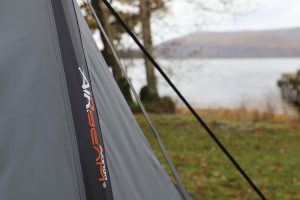
Polycotton fabric is a hybrid fabric using cotton and polyester. The split varies from brand to brand, but the cotton ratio will always be higher. The higher ratio of cotton makes the fabric feel like canvas, similar to a traditional tipi tent for reference.
Polycotton tents require a weathering process to make them waterproof before use. Skip to ‘Con’s of Polycotton fabric’ to find out more.
Pros of Polycotton Fabric
One of the main advantages of choosing a polycotton tent is its breathability. Unlike Polyester fabric, polycotton tents increase airflow inside your tent. The fabric adapts to the environment it's in, so in warm climates, it will remain cool, and in colder climates, it will feel comfortable.
Polycotton tents aren’t limited to the UK. Top brands like Zempire and Dometic use polycotton fabrics, appealing to customers from South America to New Zealand. Polycotton fabrics create comfortable camping and reduce condensation. Polycotton also allows moisture to pass through easily.
Choosing a polycotton tent will increase its longevity, ensuring years of camping fun! With UV protection, polycotton fabrics will reduce colour fading, keeping your tent feeling brand new every year.
Con’s of Polycotton fabric
The weight of your polycotton tent is one of the main factors you should consider when choosing a polycotton tent. With a higher cotton ratio, Polycotton tents are much heavier, which in turn increases the pack size. It’s important to check the weight (usually in kilograms) of the product description before purchasing a polycotton tent and be honest about whether the size and weight are something you can handle before ordering.
Polycotton tents are manufactured to last, which, of course, comes at a price. It’s no secret that polycotton tents are more pricey than your average polyester version, but these better-performance tents reflect the added pounds.
Waterproofing Process

As touched on above, polycotton tents must be weathered before use, which could be a disadvantage to some. It’s a simple process: your tent needs to be pitched in the garden, hosed down with water, and left to dry.
The water activates the cotton, making it waterproof when used again. The fabric will swell when wet and then tighten together. If you see dark streaks on your tent after doing this, this is an indication of missed areas. Don’t worry; when it rains, these will disperse, and your tent will be waterproof all over.
Conclusion
If you're looking for a top-performing tent, then Polycotton is for you. Durability and breathability are the main factors that set it apart from polyester. Ideal for intermediate campers holidaying not just in the UK but all over the globe, polycotton tents are higher in price but worth it.
A final note from us
Whether you choose Polyester or polycotton for your next camping getaway, both fabrics have a mix of pros and cons to consider. Weight, breathability, and life span are all main factors, depending on what type of camper you are. We hope this blog has helped you understand the difference better and aid you in your decision of what fabric is best for you.
For more help and advice, please call our showroom on 014520 742233, and our team will be happy to answer any queries you may have. Check out our other blog posts for more expert advice


